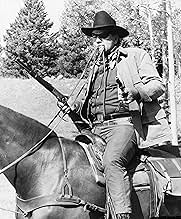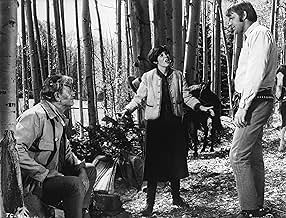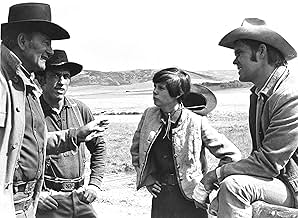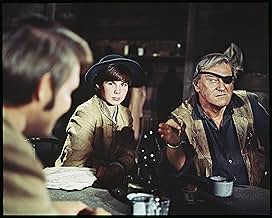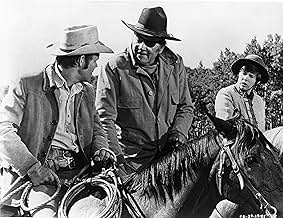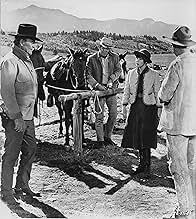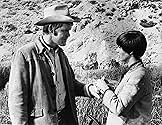Un duro Maresciallo degli Stati Uniti e un Texas Ranger aiutano un'adolescente testarda a rintracciare l'assassino di suo padre nel territorio indiano.Un duro Maresciallo degli Stati Uniti e un Texas Ranger aiutano un'adolescente testarda a rintracciare l'assassino di suo padre nel territorio indiano.Un duro Maresciallo degli Stati Uniti e un Texas Ranger aiutano un'adolescente testarda a rintracciare l'assassino di suo padre nel territorio indiano.
- Regia
- Sceneggiatura
- Star
- Vincitore di 1 Oscar
- 6 vittorie e 7 candidature totali
Recensioni in evidenza
This is perhaps best remembered today as the film for which John Wayne won his only Oscar. Halliwell's Film Guide rather ungraciously refers to it as a "sentimental Oscar, for daring to look old and fat", but there is more to Wayne's performance than that. The Academy, in fact, had tended to overlook Wayne, just as they overlooked the Western genre which provided him with most of his roles; well over a hundred films had only brought him two previous nominations. Cogburn, however, was one of his best roles. On the surface a hard-bitten, irascible old man, he has hidden depths to his character- not only the courage and determination implied by the phrase "true grit", but also a sense of humour and a capacity for tenderness. Cogburn is a lonely man, divorced from his wife and alienated from his only son, and his only friends are a Chinese storekeeper (a rare acknowledgement from Hollywood that not every inhabitant of the West was either white or an Indian) and his cat. A close relationship, however, grows up between him and the orphaned Mattie, for whom he becomes a substitute father. In turn, she becomes the daughter he never had- or perhaps even a substitute son.
Mattie is a complex character. There is much about her that is androgynous- her tomboy looks, her short hair, even her name, which can be short for Matthew as well as Matilda or Martha. She is brave and determined (there is a suggestion that the phrase "true grit" applies to her as well), but can also be a pain in the neck, especially to Cogburn. She is at times wise in the ways of the world and at others strangely innocent. She is part avenging angel, part bookish intellectual (shown by her rather formal language) and part vulnerable child. It is a role that called for an outstanding performance and got one from Kim Darby who was able to bring out all the various facets of Mattie's character. (This is the only film of hers that I have seen, but it seems strange on the strength of this that her subsequent cinema career has been so patchy). Unfortunately, Glenn Campbell, a singer with little previous acting experience, made a weak La Boeuf. It is probably as well that John Wayne did not get his way when he wanted Karen Carpenter, a singer with absolutely no previous acting experience, to play the role of Mattie instead of Darby. Great actors do not always make great casting directors.
"True Grit" does not perhaps have the depth of meaning of some of the truly great Westerns, such as "High Noon", "Unforgiven" or Wayne's last film, "The Shootist", but it is a very good one. It is a fast-moving and exciting adventure, notable for some beautiful photography of mountainous landscapes (although it is ostensibly set in relatively flat Oklahoma, it was actually filmed in Colorado and California), for one of the great iconic moments of the Western (the scene where Cogburn gallops alone into battle, guns blazing, against four opponents) and for two excellent performances in the two main roles. 7/10
I am not a huge John Wayne fan - I generally find his performances one-dimensional and wooden - but he shines here. He deserved his Best Actor Oscar, his first, after two previous nominations. The supporting cast are great too, especially Glen Campbell, Kim Darby and Robert Duvall.
However, the film does look great. Handsomely shot with great scenery, True Grit is pleasing to the eye. Elmer Bernstein's score is rousing and very fitting, while the story is interesting, most of the characters are credible and the script flows well. Also True Grit is very well directed, and there is a glorious final shoot-out. Other than Campbell and Darby, the other acting is fine. While I would have not personally given the Oscar to this particular performance(I thought he was better in The Searchers, Red River and The Quiet Man) John Wayne is excellent here, and while he doesn't appear until quite later on Robert Duvall also makes a positive impression.
All in all, a very good film but could have been better in my view. 7/10 Bethany Cox
John Wayne's parting comment in this film is directed as much at us the viewers as it is at the young woman his Rooster Cogburn character is addressing. In a way, Wayne throughout the film plays off the image he cemented in dozens of great and near-great westerns, with a nod that by 1969, he along with the western genre had fallen behind the times, that his shoot-first approach to law and order had worn thin with the critical establishment just as it does in Judge Parker's courtroom.
In that way, playing a character of such dogged homicidal cussedness as the hard-drinking, one-eyed ex-Quantrill Raider Rooster Cogburn and giving him a teenaged girl seeking justice to play off so as to showcase his essential decency seems a clever means to win Wayne an Oscar, which he finally did here, a sentimental triumph over some more heralded performances. With such an attitude, you might think "True Grit" would come off a bit of a one-trick pony 37 years on. But it doesn't. In many ways, both the film and Wayne's performance come off better than ever.
Helping matters a lot is the support Wayne receives from two women. As the heroine, Matty Ross, Kim Darby provides Wayne with a fantastic foil, doughty to the point of rudeness, forever finding fault in others but earning your good will through her simple faith in justice and loyalty to the memory of her slain father, for whom she wants Rooster's help avenging. As she is told by a horse dealer she banters with: "I admire your sand."
The other is Marguerite Roberts, whose adaptation of Charles Portis' novel bristles with good humor and an ear for the period. "If ever I meet one of you Texas waddies who ain't drunk water from a hoofprint, I think I'll... I'll shake their hand or buy 'em a Daniel Webster cee-gar," Rooster tells his braggart riding companion, a young Texas Ranger played by country singer and ex-Beach Boy Glen Campbell.
Campbell may be a novice and a third wheel in the interplay between Wayne and Darby, but he acquits himself well and delivers a worthy performance in a cast stacked with talented actors like Robert Duvall, Jeremy Slate, and Strother Martin, not to mention Dennis Hopper, hiding the long hair he made famous in "Easy Rider" that same year. Some of these actors portray bad guys, but Roberts' script and director Henry Hathaway's languid pacing allow them to present some humanizing qualities that go a long way toward making "True Grit" more than your typical shoot-em-up oater.
Even Jeff Corey, who plays a no-account named Chaney who shot Matty's father, has a funny scene when he tells Matty how to cock her pistol, then whines after she shoots him with it: "Everything happens to me!"
About the only fault I can find with the film is Elmer Bernstein's bombastic score, which employs overly ornate orchestration like kettledrums when Matty has her showdown with Chaney and is tuneless apart from the title song, which is Campbell's best moment here. Hathaway's direction is somewhat pedestrian but serves the script, and showcases some incredible autumnal vistas of tall birch and pine where Rooster and Matty search for Chaney, photographed by Lucien Ballard in a style akin to (but more dreamy than) his work on the same year's "The Wild Bunch."
1969 was the last great year for westerns, with this, "The Wild Bunch," "Butch Cassidy And The Sundance Kid," "Support Your Local Sheriff" and "Once Upon A Time In the West," and its interesting how Ballard, Corey, and Strother Martin turned up in more than one of them. But good westerns never really go out of style, they just sit on the shelf awhile like an old Stetson waiting to be rediscovered. Nobody wore a Stetson better, or deserved an Oscar more, than John Wayne. "True Grit" does the double duty of showing why he was a star and further burnishing his luster.
Lo sapevi?
- QuizStunt double Jim Burk performed the entire scene where Rooster Cogburn charged Ned Pepper's gang on horseback. John Wayne was only seen briefly in close-up, and he was riding on a trailer, not a horse.
- BlooperRooster reports Lucky Ned Pepper had robbed the KATY Flyer, a train that did not start running until 1896, long after the time in which the story is set.
- Citazioni
[Rooster confronts the four outlaws across the field]
Ned Pepper: What's your intention? Do you think one on four is a dogfall?
Rooster Cogburn: I mean to kill you in one minute, Ned. Or see you hanged in Fort Smith at Judge Parker's convenience. Which'll it be?
Ned Pepper: I call that bold talk for a one-eyed fat man.
Rooster Cogburn: Fill your hand, you son of a bitch!
- Versioni alternativeWhen submitted for a rating from the MPAA in 1969, the film was given an "M". The film was edited and rerated "G". The American VHS version contains the "G" rated cut while the DVD is the uncut "M" version (which would be printed as "PG" since the symbol was changed in the 1970s).
- ConnessioniEdited into The Kid Stays in the Picture (2002)
I più visti
- How long is True Grit?Powered by Alexa
Dettagli
- Data di uscita
- Paese di origine
- Sito ufficiale
- Lingua
- Celebre anche come
- Temple de acero
- Luoghi delle riprese
- Azienda produttrice
- Vedi altri crediti dell’azienda su IMDbPro
Botteghino
- Lordo Stati Uniti e Canada
- 276.418 USD
- Fine settimana di apertura Stati Uniti e Canada
- 157.788 USD
- 5 mag 2019
- Lordo in tutto il mondo
- 276.418 USD
Contribuisci a questa pagina



